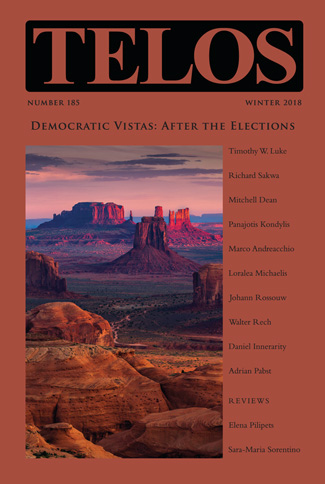Loralea Michaelis’s “Temporality and Revolution in Horkheimer’s Early Critical Theory: A Luxemburgian Reading of Dämmerung” appears in Telos 185 (Winter 2018). Read the full article at the Telos Online website, or purchase a print copy of the issue in our online store. Individual subscriptions to Telos are available in both print and online formats.
 This article challenges the related assumptions about temporality and the significance of success and failure for revolutionary activism that have governed the standard interpretation of Horkheimer’s critical theory as foundering on the disappointment of its early revolutionary expectations. The early influence of Luxemburg on Horkheimer is used to bring into clearer focus Horkheimer’s handling of the problem of a failed revolution in Dämmerung, his earliest published work, which bears a striking resemblance to Luxemburg’s own positions on the centrality of failure to the development of the revolution as well as her critique of the success-oriented politics of reformism. Dämmerung foregrounds the German revolution of 1919–23, but the working through of its failure yields not pessimism over the future but a challenge to the preoccupation with future prospects which underlies both pessimism and optimism; it also yields a conception of revolution as a present-oriented resistance that not only does not expect to succeed in its aims but regards the aim of success with a skeptical eye. Contrary to the standard reading, the failed revolution is not a problem for which Horkheimer’s early critical theory needs to find a solution; rather, it is its practical correlative.
This article challenges the related assumptions about temporality and the significance of success and failure for revolutionary activism that have governed the standard interpretation of Horkheimer’s critical theory as foundering on the disappointment of its early revolutionary expectations. The early influence of Luxemburg on Horkheimer is used to bring into clearer focus Horkheimer’s handling of the problem of a failed revolution in Dämmerung, his earliest published work, which bears a striking resemblance to Luxemburg’s own positions on the centrality of failure to the development of the revolution as well as her critique of the success-oriented politics of reformism. Dämmerung foregrounds the German revolution of 1919–23, but the working through of its failure yields not pessimism over the future but a challenge to the preoccupation with future prospects which underlies both pessimism and optimism; it also yields a conception of revolution as a present-oriented resistance that not only does not expect to succeed in its aims but regards the aim of success with a skeptical eye. Contrary to the standard reading, the failed revolution is not a problem for which Horkheimer’s early critical theory needs to find a solution; rather, it is its practical correlative.


